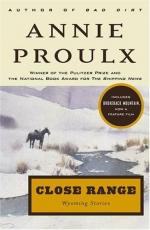|
This section contains 2,457 words (approx. 9 pages at 300 words per page) |

|
SOURCE: Kowalewski, Michael. “Losing Our Place: A Review Essay.” Michigan Quarterly Review 40, no. 1 (winter 2001): 242–56.
In the following excerpt, Kowalewski discusses the significance of place in American fiction and offers a mixed assessment of Close Range.
Writing about “place” in American literature has often focused upon the fine-grained appreciation and celebration of American landscapes, in all their mind-bending intricacy and prodigality. American places have been repeatedly honored for their capacity (in Wes Jackson's words) to stimulate human “en-light-enment,”1 to teach us about the persistence of nature in our lives, if we will but learn how to observe, understand, and immerse ourselves in it in creative, responsible ways. There is a kind of essential mystery about the delicate and complex biological processes by which we have been hard-wired, over evolutionary time, to respond to the places in which we have lived. As the naturalist David Rains Wallace puts...
|
This section contains 2,457 words (approx. 9 pages at 300 words per page) |

|


